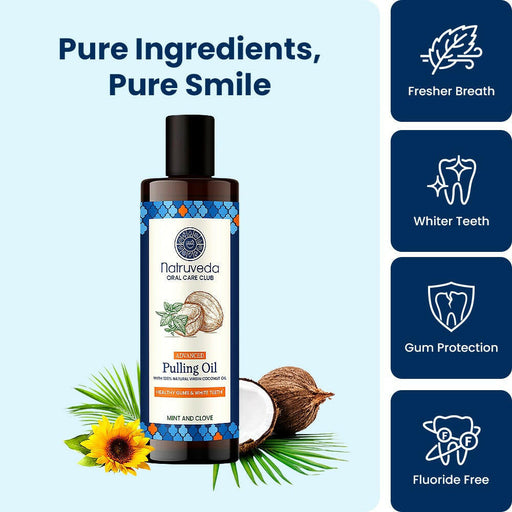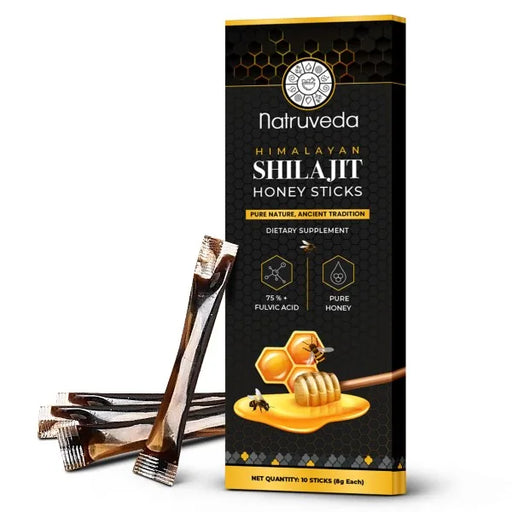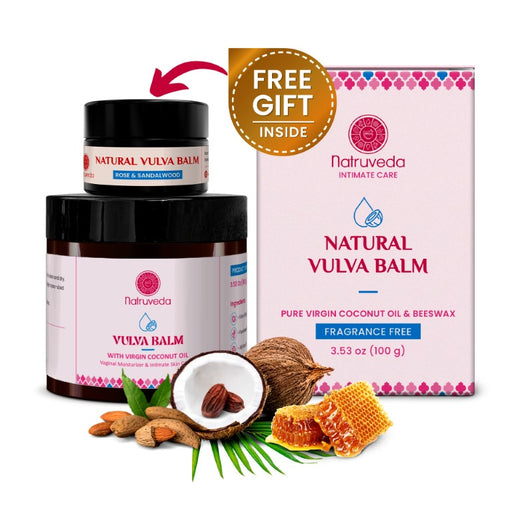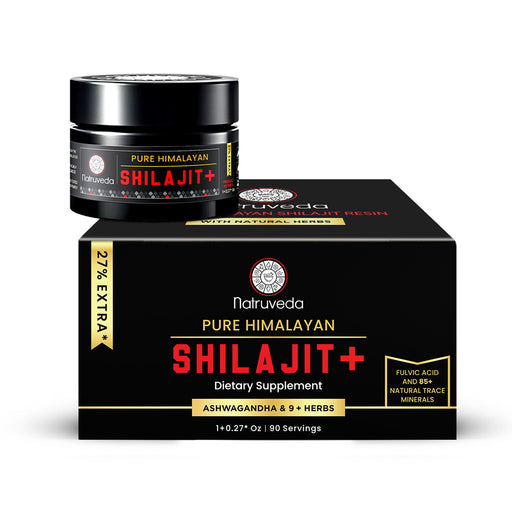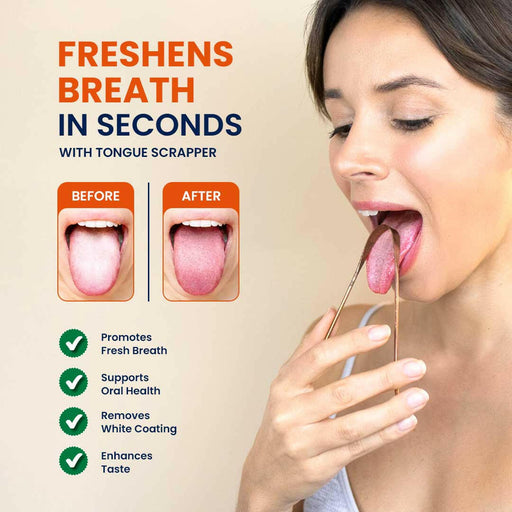Why Tongue Scraping Matters in Daily Oral Care
Tongue scraping may be an ancient Ayurvedic practice, but today, it’s making a modern comeback—and for good reason. As more people seek natural, effective ways to elevate their self-care routines, this simple tool is gaining attention for its powerful impact on oral hygiene and overall wellness.
Still, many ask, "What does a tongue scraper do, and does the material matter?”
The short answer? Yes. A tongue scraper helps remove bacteria, toxins, and food debris from the tongue's surface—things that brushing and flossing alone can’t reach. This quick 10-second ritual supports fresher breath, better taste perception, and a cleaner mouth. But not all tongue scrapers are created equal.
In this blog, we’ll compare two popular options: the copper tongue scraper and the metal tongue scraper made from stainless steel. We’ll break down their differences, highlight key tongue scraper benefits, and help you decide which one qualifies as the best tongue scraper for daily use.
Whether you’re just learning how to use a tongue scraper, curious about how often you should scrape your tongue, or ready to upgrade your routine with a tool that aligns with your wellness goals—you’re in the right place.
Let’s dive into the benefits, differences, and ancient wisdom behind this underrated yet powerful oral care practice.
What Does a Tongue Scraper Do?
If you’ve ever wondered, “What does a tongue scraper do?” the answer is simple and surprisingly powerful. A tongue scraper is a specially designed tool that gently removes bacteria, food particles, dead cells, and toxins from the surface of your tongue—things that are brushing and flossing often miss.
This layer of buildup, especially visible as a white coating, can be a major source of bad breath and oral imbalance. By using a metal tongue scraper or a traditional copper tongue scraper, you can eliminate these unwanted residues and start your day with a cleaner, fresher mouth.

Key Benefits of Tongue Scraping:
-
Reduces Bad Breath: Tongue scraping is one of the most effective ways to keep breath fresh throughout the day by removing odor-causing bacteria.
-
Boosts Oral Hygiene: It complements brushing and flossing by targeting areas your toothbrush doesn’t reach—especially the back of the tongue where bacteria love to hide.
-
Supports Digestion: According to Ayurveda, digestion begins in the mouth. Scraping away toxins (ama) helps support gut health and overall wellness.
-
Enhances Taste Perception: Clearing the tongue surface allows your taste buds to function better, making food taste more vibrant and satisfying.
Many people are surprised by how easy it is to add this step to their morning routine. You'll quickly notice the difference it makes once you learn how to use a tongue scraper. It pairs beautifully with oil pulling (especially with Natruveda’s Advanced Pulling Oil) and seamlessly alongside brushing and flossing.
Whether you opt for a copper tongue scraper—known for its natural antimicrobial properties—or a modern metal tongue scraper, this tool may become your favorite 10-second habit.
If you're wondering how often you should scrape your tongue, once every morning is ideal for maintaining a clean tongue and fresh breath. It’s a small step with major rewards, especially when choosing the best tongue scraper for your needs.
The Case for Metal: Why Plastic Isn’t Ideal
Material matters more than most people realize when choosing the best tongue scraper. While plastic tongue scrapers are inexpensive and easy to find, they often lack effectiveness, hygiene, and durability.
Why Plastic Tongue Scrapers Don’t Measure Up
Plastic tongue scrapers tend to be less rigid, making them less effective at removing the sticky film of bacteria and food debris from the tongue. They can also wear down quickly, harbor bacteria over time, and must be replaced more often. In short, they lack the durability and precision needed for a truly clean tongue.
If you’re serious about oral care and want a long-lasting tool that delivers consistent results, it’s time to go metal.
Metal Tongue Scrapers: Built for Performance
Enter the metal tongue scraper—a category that includes both copper and stainless steel options. These materials offer better control, more thorough scraping, and are significantly more straightforward to sanitize. Plus, metal tools hold their shape, resist wear, and last for years with proper care.
If you’ve been wondering what a tongue scraper does, the answer is simple: it removes harmful buildup from your tongue that can lead to bad breath and poor oral hygiene. And to do that job well, you need the right tool.
Copper vs. Stainless Steel: Who Wins?
Both copper and stainless steel are considered top contenders in searching for the best tongue scraper. While stainless steel is widely available and easy to clean, copper tongue scrapers have natural antimicrobial properties and a softer, more flexible feel that many users prefer—especially those who follow Ayurvedic wellness practices.
Choosing a copper tongue scraper isn’t just about tradition—it’s about performance, longevity, and supporting a cleaner, healthier mouth.
So, if you’re still scraping with plastic or not, it might be time to upgrade your routine. Once you learn how to use a tongue scraper properly and incorporate it daily, you’ll wonder how you skipped this essential step.
And remember: for lasting results, how often should you scrape your tongue? Ideally, once every morning before brushing or eating. It’s a small habit with huge benefits.
Copper Tongue Scraper: Ancient Wisdom Meets Antibacterial Power
When selecting the best tongue scraper, copper stands out—not just for its performance but also for its deep connection to ancient Ayurvedic wisdom. Used for centuries in India as part of daily oral detox rituals, the copper tongue scraper is much more than a trend—it’s a time-tested tool with real benefits.
Rooted in Ayurveda, Backed by Nature
In Ayurveda, oral hygiene is considered a key pillar of daily wellness. Copper, known for its ability to balance the body’s doshas, has long been used in Ayurvedic tools due to its natural antimicrobial and detoxifying properties. Even today, modern research supports what ancient practitioners knew: copper surfaces actively fight harmful microbes.
So, if you're asking, "What does a tongue scraper do?" The answer is elevated with copper. It removes the unwanted coating on your tongue while supporting the health of your oral microbiome—a win-win for anyone looking to improve their overall wellness.
Benefits of a Copper Tongue Scraper
Here’s why copper continues to be a top choice in the metal tongue scraper category:
-
✅ Self-Sterilizing Surface: Copper naturally resists the growth of bacteria, fungi, and viruses, making it more hygienic between uses than plastic or even stainless steel.
-
✅ Balances Oral Microbiome: A clean tongue helps regulate bacteria in the mouth, which can support digestion, immunity, and fresher breath.
-
✅ Eco-Friendly & Recyclable: Unlike disposable plastic alternatives, copper tongue scrapers are sustainable, long-lasting, and 100% recyclable.
-
✅ Comfortable & Effective: Copper’s slightly softer feel allows for a gentler, more comfortable scraping experience—especially for sensitive tongues.
When choosing the best tongue scraper, the material matters—copper delivers performance and purpose. At Natruveda, our Ayurvedic values guide everything we create, so our 100% pure copper tongue scraper is crafted to support your daily ritual with care, tradition, and intention.
And remember, if you’re wondering how often you should scrape your tongue, the Ayurvedic recommendation is straightforward: every morning before brushing or eating. It’s a slight shift with powerful results.
Stainless Steel Tongue Scrapers: Durable but Less Dynamic
While copper may lead with tradition and natural benefits, stainless steel has also earned a spot as the best tongue scraper, particularly for those who value durability and ease of maintenance.
Pros of Stainless Steel Tongue Scrapers
As a popular option in the metal tongue scraper category, stainless steel offers a few clear advantages:
-
✅ Rust-Resistant: Stainless steel resists corrosion and maintains its sleek appearance over time, even with daily rinsing.
-
✅ Long-Lasting & Easy to Clean: This material is tough and durable, requiring minimal upkeep—rinse after each use and give it a deeper clean weekly.
For users who want a low-maintenance tool that holds up over the years, stainless steel is a practical choice. But is it the best tongue scraper for everyone? Not quite.
Cons to Consider
Despite its strengths, stainless steel lacks some of the benefits offered by a copper tongue scraper:
-
❌ No Natural Antibacterial Properties: Unlike copper, stainless steel doesn’t actively kill bacteria. This means it must be cleaned more thoroughly and regularly to avoid buildup.
-
❌ Can Be Rigid or Harsh: Some users find stainless steel scrapers too stiff, especially when learning how to use a tongue scraper or for those with sensitive tongues. The scraping action can feel too aggressive compared to copper’s gentler glide.
The material can make a noticeable difference if you’re exploring what a tongue scraper does. While both tools help remove toxins, debris, and bacteria from the tongue, a copper tongue scraper supports oral balance and detoxification through its Ayurvedic roots and natural antimicrobial qualities.
And remember: no matter which material you choose, the key is consistency. Knowing how to scrape your tongue effectively and how often (ideally, once every morning) can improve your oral hygiene routine.

Copper vs. Stainless Steel: Which Is the Best Tongue Scraper?
Now that we’ve explored each material's strengths and shortcomings, it’s time for a direct comparison: Which is the best tongue scraper for daily use, copper or stainless steel?
Let’s break it down across the categories that matter most:
|
Feature |
Copper Tongue Scraper |
Stainless Steel Tongue Scraper |
|
Effectiveness |
Flexible and glides easily, ideal for beginners and sensitive users |
Effective but may feel rigid or harsh |
|
Hygiene |
Naturally antibacterial and self-sterilizing |
Requires frequent cleaning; no natural antimicrobial properties |
|
Longevity |
Long-lasting with proper care |
Extremely durable and rust-resistant |
|
Sustainability |
Eco-friendly, recyclable, zero plastic |
Sustainable and recyclable |
|
Comfort |
It has a softer feel on the tongue and is less likely to irritate |
It can be rigid; less forgiving on delicate tongues |
More Than Just Cleaning: The Ayurvedic Advantage
If you’ve ever asked what a tongue scraper does, the answer is more than just surface-level hygiene. According to Ayurvedic wisdom, the tongue reflects what's happening internally—especially in your gut. A coated tongue can indicate the presence of ama (toxins), which daily scraping helps remove as part of a holistic detox routine.
Ayurvedic practitioners have long said, “The mouth is the gateway to health.” Using a copper tongue scraper aligns with this ancient principle, offering an energetic and microbial balance that modern tools can’t replicate.
Expert Insight
Modern wellness experts are taking note, too. Research shows that copper’s antimicrobial properties can eliminate bacteria like Streptococcus mutans and Candida albicans, making it a natural choice for supporting oral microbiome health.
When choosing the best tongue scraper, these extra wellness benefits make copper hard to beat. It doesn't just clean—it helps you stay in balance.
How Often Should You Scrape Your Tongue?
One of the most common questions is: How often should you scrape your tongue? The answer is simple—once daily in the morning is ideal. This timing allows you to remove the buildup of bacteria, toxins, and food debris that naturally accumulate on your tongue overnight.
For those seeking an even deeper oral care routine, tongue scraping can also be done at night before bed, especially after heavy meals or if you’re dealing with chronic bad breath.
Doing It Right: Signs & Tips
Once you know how to use a tongue scraper properly, the process is quick, comfortable, and incredibly effective. After a few gentle strokes from back to front (using either a metal or a copper tongue scraper), your tongue should appear clean and pink—free of any white or yellow coating.
You’re doing it right if:
-
Your mouth feels fresher immediately after scraping
-
Your breath improves throughout the day
-
You notice a clearer taste sensation
Avoid scraping too aggressively, as this can irritate your tongue. Also, remember to rinse and clean your tongue scraper after each use for hygienic storage.
When to Replace Your Scraper
While stainless steel scrapers can last years, plastic ones wear out quickly. If you're using a copper tongue scraper, it can last just as long as stainless—if not longer—with proper care. Replace your scraper when it becomes misshapen, overly tarnished, or uncomfortable.
The Daily Habit That Supports Your Whole Body
Understanding what a tongue scraper does extends beyond oral hygiene. In Ayurvedic tradition, tongue scraping is linked to improved digestion and gut health. By removing ama (toxins) from the tongue, you reduce the load on your digestive system and support your body’s natural detox process.
Whether you choose a copper or metal tongue scraper, committing to this simple ritual can greatly impact your oral microbiome, breath, and overall wellness—making it a strong contender for the best tongue scraper in your routine.
Final Verdict & Call to Action
Regarding oral care, stainless steel and copper offer solid improvements over plastic—but if you’re looking for more than just functionality, the copper tongue scraper stands out.
From its natural antimicrobial properties to its deep roots in Ayurvedic tradition, copper offers benefits beyond surface-level hygiene. It supports detox, balances your oral microbiome, and aligns with holistic wellness practices—making it the best tongue scraper for those who care about both results and ritual.
While a metal tongue scraper made from stainless steel is practical and durable, it lacks the natural antibacterial edge and gentle feel that copper provides. And if you're still wondering what a tongue scraper does, the answer becomes even more meaningful when you view this tool as a small but mighty act of daily self-care.
So, if you're building your oral wellness routine and wondering how often you should scrape your tongue, let this be your starting point: every morning, with intention, using a tool that aligns with your body and values.
✨ Ready to Experience the Benefits?
👉 Shop Natruveda’s 100% Pure Copper Tongue Scraper—a sustainably made, Ayurvedic-inspired tool designed for comfort, clarity, and long-lasting freshness.
Let your mornings begin naturally with a clean tongue, a calm mind, and a fresh start.






